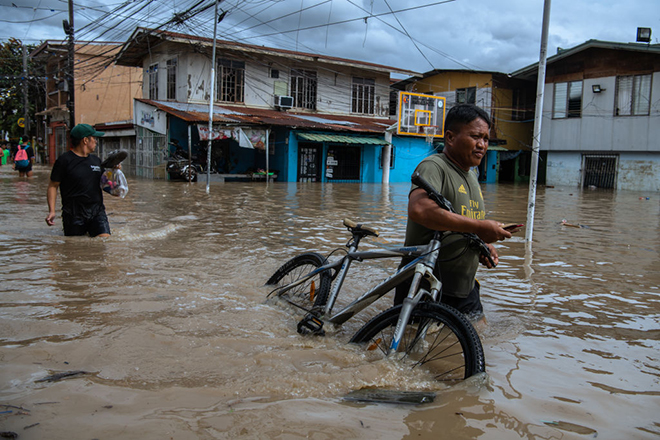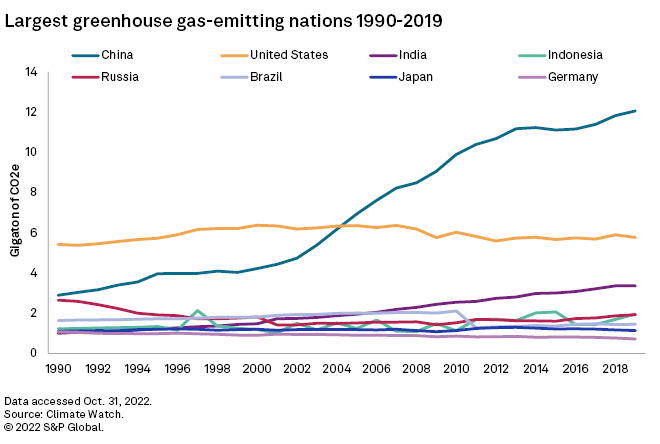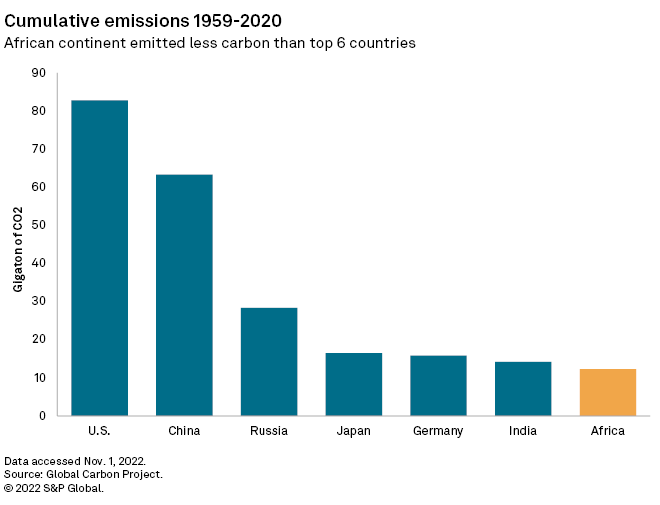
Residents wade through a flooded village in the Philippines on Oct. 30 following a tropical storm that killed dozens. The effects of climate change are increasing the number and severity of natural disasters around the world. |
Seven years have passed since nearly all nations inked a historic deal to try to limit the rise in global average temperatures to 1.5 degrees C and avoid the worst impacts of climate change.
But when diplomats gather Nov. 6 in Sharm El-Sheikh, Egypt, for the United Nations COP27 climate summit, they must first take stock of what has not been accomplished since they met in Glasgow, Scotland, a year ago. At that time, all parties to the 2015 Paris Agreement on climate change agreed to submit updated and more ambitious carbon reduction strategies by September 2022.
"What did we receive? Twenty-three of nearly 200 parties submitted their revised climate plans," Simon Stiell, the U.N. climate chief, told a meeting of national leaders from vulnerable nations Oct. 4. "To call it a failing grade is an understatement."
By the end of October, only one more revised plan, known as a Nationally Determined Contribution, had been submitted.
"Under current policies, the world is headed for 2.8 degrees of heating by the end of the century," United Nations Secretary-General António Guterres warned as his agency released a report showing the large gap between today's emission reduction efforts and what nations must do to slow planetary warming. "We are headed for a global catastrophe."
Despite the deluge of grim messaging as COP27 drew near, expectations for a breakthrough on climate finance and other key objectives for the summit were muted. But the leaders' choice to convene in Sharm El-Sheikh, amid geopolitical challenges and fears of a global economic recession, is a success in and of itself, some observers say.
Compensation for loss, damage looms large
Aside from raising ambitions for carbon reduction, a top item on the COP27 agenda is negotiating a finance mechanism to help vulnerable nations adapt to irreversible climate impacts that occur today.
The call for such support goes back to the early 1990s when the Alliance of Small Island States first asked to be compensated for sea level rise threatening their existence. The campaign gained momentum during 2021's climate summit in Glasgow, but progress has been uneven as wealthy nations with their own climate struggles pushed back.

The group Oxfam has estimated that the damage and losses caused by irreversible climate change, such as gradually rising oceans, will be between $290 billion and $580 billion annually by 2030 as the economic toll of climate change grows.
Nations most vulnerable to damage caused by irreversible climate change are often the ones least responsible for Earth's warming. A new study in the journal Science Advances found that low-income regions lost 6.7% of gross domestic product per capita per year between 1992 and 2013 due to extreme heat, while the wealthiest regions saw a 1.5% GDP per capita loss.
"Forty-eight Sub-Saharan African countries equal 0.55% of emissions and then you have 20 countries that are 80% of all emissions — it's pretty hard to argue there that you don't have a certain responsibility to step up and make things happen," John Kerry, the Biden administration's top climate envoy, told a Council on Foreign Relations event Oct. 25. "But you've got to make things happen that can work, that can be functional in your own political system, that actually can deliver money."
The U.S. will act in good faith, Kerry said, "and we need the unity of nations in order to be able to proceed forward."
The Union of Concerned Scientists and 142 other U.S. organizations urged Kerry in a recent letter to "move beyond talk" in Egypt to advance the long-awaited finance facility for loss and damage.
$100B in promised climate finance
The U.S. and other wealthy nations will also be under pressure at COP27 to deliver on their 2009 promise to mobilize $100 billion annually in climate finance. The funding will help developing nations reduce greenhouse gas emissions and adapt to a changing climate. In 2020, developed countries raised $83.3 billion, a 4% increase from 2019 but still short of their pledge, according to estimates by the Organization for Economic Cooperation and Development.

Climate finance, as well as loss and damage compensation, will require tough negotiations at a time when the world has been broadsided by inflation and supply chain problems during the coronavirus pandemic. Energy and food shortages following Russia's invasion of Ukraine have added more pain and uncertainty.
Those challenges "are going to have implications for the countries as they manage those issues at the same time as they try to pursue ambitious climate goals and address adaptation concerns," said Steve Rose, a senior economist with the Electric Power Research Institute and a lead author for the Intergovernmental Panel on Climate Change's climate adaptation report released earlier this year. "It's just important to keep that in mind."
The panel's most recent reports, to which hundreds of climate scientists contributed, will likely influence and inform conversations at COP27, Rose said in an interview. The key takeaway of the adaptation and subsequent decarbonization pathway report is that even if greenhouse gas emissions were halted today, climate change will continue for several more decades.
The scientific input can help negotiators at COP27 focus on the key question of how to prepare for more climate risks while trying to finance adaptation strategies that will be needed around the world, Rose said. Underlying such negotiations is the urgent need to rein in the climate-warming emissions that caused the problem in the first place.
Top 3 emitters in spotlight
The nations with the largest carbon footprints, China and the U.S., have frosty relations due to trade disputes and other long-standing policy disagreements.
China, the world's largest emitter of greenhouse gases with a population of 1.4 billion, has halted financing of new coal plants abroad but continues to invest in plants domestically to meet electricity needs and grow its economy. The country has said it will reach peak emissions in 2030 and be carbon-neutral in 2060, a decade later than what was called for under the Paris Agreement.
Despite its rapid growth in renewable generation, China is still expected to rely on coal-fired power plants for 51% of its electricity needs by 2030, according to a recent analysis by S&P Global Commodity Insights.
India, currently the third-largest emitter, released an updated Nationally Determined Contribution to the United Nations in August, saying it will reduce the emission intensity of its gross domestic product by 45% by 2030. The nation, which has nearly as many people as China and huge electrification needs, retained its plan to reach net-zero emissions by 2070.
The Climate Action Tracker, an initiative by Climate Analytics and NewClimate Institute that rates country emissions mitigation efforts, deems actions by China and India to be "highly insufficient."
The U.S. fares better in the survey, placed in the "insufficient" category. That is still a significant improvement from the rating of "critically insufficient" after former President Trump pulled the country out of the Paris climate accord and rolled back Obama-era climate policies.
Climate Action Tracker now finds the U.S. domestic target "almost sufficient." During his first few months in office, President Biden pledged to halve the country's economywide emissions by 2030 below 2005 levels and to reach net-zero emissions by 2050.
Importantly, the U.S. will arrive at COP27 with more credibility after the passage of the landmark Inflation Reduction Act in August — the largest infusion of clean energy and climate investments in U.S. history. As that funding begins to translate into action on the ground, it will signal to other countries that the U.S. is within reach of its 2030 target, according to Kelly Levin, chief of science, data and systems change for the Bezos Earth Fund.
"As we move into COP27 … this is one of the few places where we've started to see movement," Levin told an Oct. 21 webinar where the Bezos Earth Fund and several other organizations discussed a new report tracking global climate action. "I think the U.S. walks in having at least something serious at the domestic level."
S&P Global Commodity Insights produces content for distribution on S&P Capital IQ Pro.



